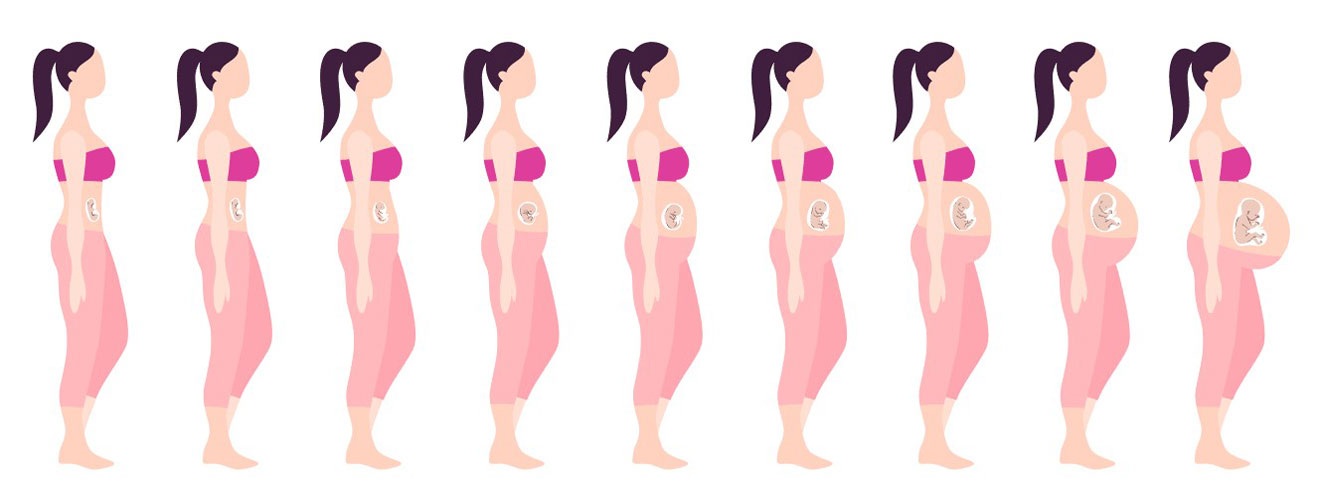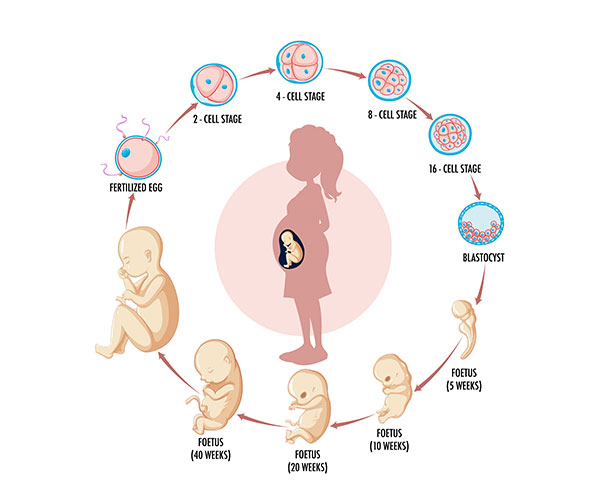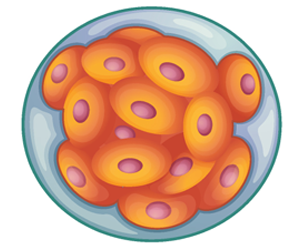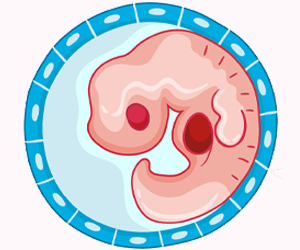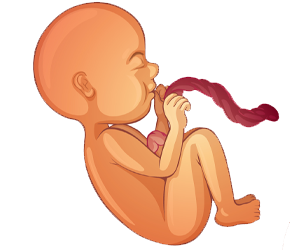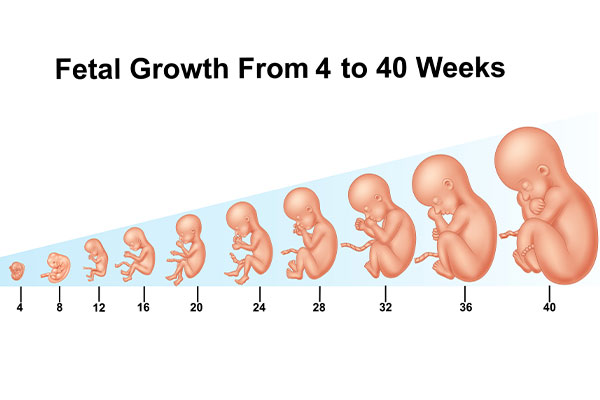Here is Your Week-by-Week Guide to Pregnancy Stages
First Trimester: Weeks 1 to 12
Rapid cell division and organ creation occur throughout your first trimester. Did you know that it takes many weeks for many women to become aware that they are pregnant? Yes, it often happens.

Month 1
 Weeks 1-2: Conception and Early Cell Division
Weeks 1-2: Conception and Early Cell Division
- The first day of your last menstrual period (LMP), even before fertilization, marks the start of your pregnancy.
- Ovulation takes place during the 2nd week, and if sperm and egg come into contact, fertilization may take place.
 Weeks 3-4: Implantation and Blastocyst Formation
Weeks 3-4: Implantation and Blastocyst Formation
- After fertilization, an egg develops into a blastocyst (a ball of rapidly dividing cells), which then moves to the uterus to be implanted.
- The womb lining is rich with blood and prepared to nourish a baby at this stage of the mother's menstrual cycle.
- The placenta, yolk sac, and amniotic sac start to form.
- The mother's blood provides nutrients for the blastocyst, which sticks firmly to the uterine wall.
Month 2
 Weeks 5-6: Organ Development Begins
Weeks 5-6: Organ Development Begins
- An embryo looks like a sesame seed.
- The neural tube begins to form, eventually developing into the brain and spinal cord.
- An ultrasound shows the heart beginning to beat.
- Early facial features and limb buds start to form during this phase of your pregnancy.
 Weeks 7-8: Organ Development Continues
Weeks 7-8: Organ Development Continues
- The development of major organs in your baby, such as the kidneys, liver, and lungs, starts.
- The embryo is now starting to move somewhat and has arm and leg buds, and because of the brain's fast growth, the head is larger than the body.
- Genitals start to develop, and soft cartilage starts to give way to bones.
- Ears start to develop, and eyes become visible, and the embryo receives blood and oxygen through the completely grown umbilical cord.
Month 3
 Weeks 9-12: Transition to Fetus
Weeks 9-12: Transition to Fetus
- We now refer to the embryo as a fetus.
- The toes and fingers are complete, and the structures of the fetus's face are more developed in the 9th week of pregnancy.
- The heart has four chambers and beats hard, and the arms and legs may now be flexed.
- In addition to the placenta starting to release hormones, fingernails are starting to grow in the 10th week.
- The mother is unaware of the fetus's first little movements in the 11th week, and the skin remains transparent, but the bones are becoming harder.
- To safeguard growing eyes, eyelids shut, and the fetus is consuming amniotic fluid and urinating it.
- In the 12th week, the fetus is consuming amniotic fluid and urinating it, and the liver generates bile, and the digestive, urinary, and circulatory systems function.
Second Trimester
Weeks 13 to 27
Pregnancy's second trimester is frequently known as the "honeymoon period." Usually, morning sickness goes away, and the fetus keeps growing quickly. Your mood improves, unpleasant symptoms reduce, and you notice a baby bump.
Month 4
 Weeks 13-16: Better Human-Like Structure
Weeks 13-16: Better Human-Like Structure
- The fetus's big head starts to develop relative to its body as vocal cords mature in the 13th week of gestation.
- Fingerprints start to form, the external genitalia reach complete development, and skin begins to thicken with fine hair visible in the 14th week of pregnancy.
- As your pregnancy enters the 15th week, your baby makes facial motions, yawns, and stretches, with its skeleton being ossified. While the fetus's lungs are starting to form, it practices breathing using amniotic fluid.
- In the 16th week of gestation, the fetus's limb movements get better, and the lips and ears are grown enough to hear your talks.
Month 5
 Weeks 17-20: Better Senses and More Movements
Weeks 17-20: Better Senses and More Movements
- In the 17th week, the fetus's skin is coated in vernix, a white substance. Taste buds are growing, and amniotic fluid is used as a starting point for swallowing exercises to support digestion.
- During the eighteenth week of pregnancy, the fetus's digestive system is now functional. Your baby's ears begin to protrude from the head at eighteen weeks into the pregnancy, and your baby can sense the noises.
- The fetus starts waking and sleeping in cycles, and the placenta is fully formed and provides nutrition in the 19th week of pregnancy.
- When it's 20 weeks of gestation, your baby may be 6.3/5 inches and weigh around 320 grams by now.
Month 6
 Weeks 21-24: Lung and Brain Development
Weeks 21-24: Lung and Brain Development
- Lanugo, a fine, downy hair, covers your baby's whole body, and additionally, the sucking reflex is growing, so your baby could be able to suck a thumb by now.
- In the twenty-first week of pregnancy, there is frequent and synchronized movement of the legs. At this point, the fetus's bone marrow aids in the production of blood cells.
- The fetus can touch its ears and the umbilical cord, and its grip is becoming stronger. Your heartbeat is audible to your fetus as your pregnancy enters the 22nd week.
- In the 23rd week of pregnancy, the fetus has more eye movements, and its lungs make a substance called surfactant. The fetus may live after the 23rd week with special care if the birth is early.
- Your baby may be around 8.4 inches by now, and its lungs are well developed by the 24th week of pregnancy.
Month 7
 Weeks 25 to 27: Getting Ready to Survive
Weeks 25 to 27: Getting Ready to Survive
- The skin of the fetus is plumper and less wrinkled when there is more body fat. Also, the neurological system of the fetus is rapidly growing as your pregnancy reaches the 25th week.
- Eyelashes and eyebrows of the fetus have developed by week 26 of pregnancy, and by now, your baby may weigh close to 2 pounds (820 grams).
- The second trimester is over with the 27th week of pregnancy, when your baby's nervous system is still developing and it's gaining fat.
Third Trimester
So, you've entered the final stage of your pregnancy, and your baby is preparing to be born outside your womb. The fetus rapidly acquires weight during the third trimester, which supports it after delivery. As your due date draws near, your doctor will keep a careful eye on you, and you may need to visit your doctor every two weeks, and subsequently every week.
Month 8
 Weeks 28 to 32: Stretching, Getting Stronger, and Weight Gain
Weeks 28 to 32: Stretching, Getting Stronger, and Weight Gain
- As your pregnancy comes to the 28th week, the fetus now partially opens its eyelids. In your uterus, the fetus may start to turn head-down as it prepares to be born.
- Your baby is capable of gripping, stretching, and kicking as your pregnancy phase enters the 29th week.
- During the 30th week of gestation, your baby can open its eyes. By the end of this week, your baby may have healthy hair, and the bone marrow is where red blood cells are made.
- Your baby has completed the majority of its primary development at 31 weeks into your pregnancy and is putting on weight fast. You can likely experience clearer patterns between its sleeping and waking states.
- The toenails of your unborn child become visible at thirty-two weeks of your pregnancy. Plus, your baby begins to lose the lanugo, or soft, downy hair, that has been covering their skin for the last few months.
Month 9
 Weeks 33 to 36: Preparing for Birth
Weeks 33 to 36: Preparing for Birth
- To get ready to give birth, the head moves lower, and bones harden, and the skull remains soft and flexible in the period of 33 weeks.
- By the 34th week of your pregnancy, the vernix, which shields the fetus's skin, begins to thicken, and here your baby is almost twelve inches.
- Your baby has less room to move since they take up the majority of the amniotic sac, and gains the capacity to swallow and suck by the 35th week of gestation.
- With more fat depositing beneath the skin, your baby's skin gets smoother, and at this phase, most babies have lowered their heads. The baby may weigh nearly 2.5 kg. Your trusted gynecologist in Siliguri will be there to guide you thoroughly.
Month 10
 Weeks 37 to 40: Final Phase
Weeks 37 to 40: Final Phase
- The fetus's toenails extend to the tips of its toes, and you may begin to feel the fetus slip into your pelvis in the 37th week of pregnancy, considered early full-term.
- During the 38th week of pregnancy, your baby may weigh around (6 pounds or 2,900 grams); however, the weight differs. The baby now has a fully grown nervous system.
- As your pregnancy approaches the 39th week, your baby is considered full term, and the chest of your baby is now larger.
- Finally, your due week has come, and your little one inside you is ready to be born. At the 40th week of pregnancy, the baby weighs some 7/ 9 pounds, but there are many different sizes of healthy newborns.
You must consider your health expert's guidance and call your doctor immediately if you have any signs of labour.
What are the signs of labour?
- Mild cramping or a dull backache
- Mucus plug loss
- Mild, irregular contractions
- Strong, rhythmic contractions
- A need to use the toilet often
- Lower abdominal pressure
- Water breaks
When You Should Call Your Doctor Immediately
- Please call your doctor right away if you notice signs like:
- Vaginal bleeding
- Excruciating headaches or changes in eyesight
- Low or no fetal movement
- High temperature or chills
- High blood pressure and edema (swelling)
Here are Some Tips for Your Healthy Pregnancy
- Nutrition Is Important: Have wholesome foods like fruits, vegetables, lean meat, and whole grains.
- Keep Moving: Prenatal yoga and walking all improve endurance and circulation until your doctor limits activities.
- Hydration is Essential: Drink enough amounts of water each day as advised.
- Sleep Wisely: To help your baby's circulation, follow sleep and rest advice from your gynecologist.
- Emotional Well-being: Seek support groups or speak with your gynecologist about stress or worry.
What Does It Mean for a Pregnancy to be Full-term?
- Early-term: 37 0/7 weeks to 38 6/7 weeks of pregnancy
- Full-term: 39 0/7 weeks to 40 6/7 weeks of pregnancy
- Late-term: 41 0/7 weeks to 41 6/7 weeks of pregnancy
- Post-term: 42 0/7 weeks of pregnancy and beyond
We believe each pregnancy is unique and special, and knowing the week-by-week progress of fetal growth boosts your relationship with your little one and empowers you to make wise choices. This journey, from before the first kick to the first cry, is both overwhelming and magical. Thus, this pregnancy guide is to educate and support you. If you need expert support, whether for a high-risk pregnancy, meet the most trusted fetal medicine specialist and gynecologist in Siliguri or near you.
